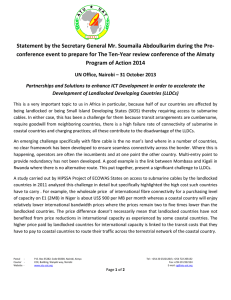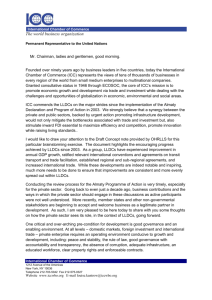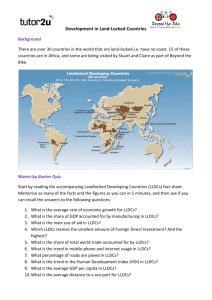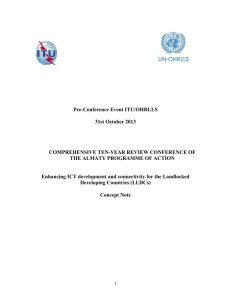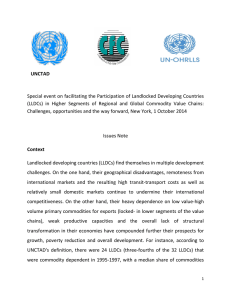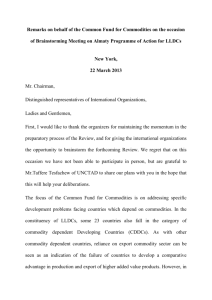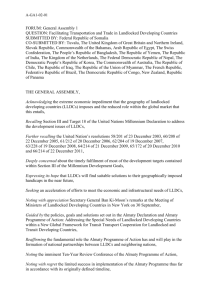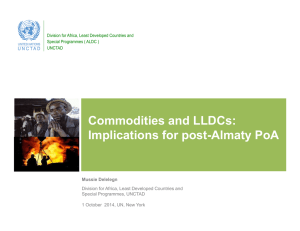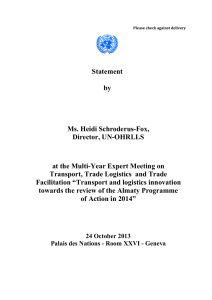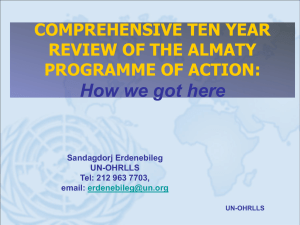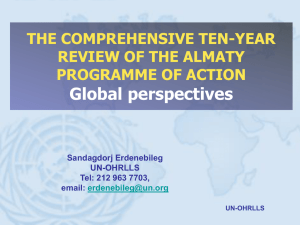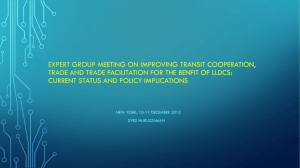Statement by - Paper Smart
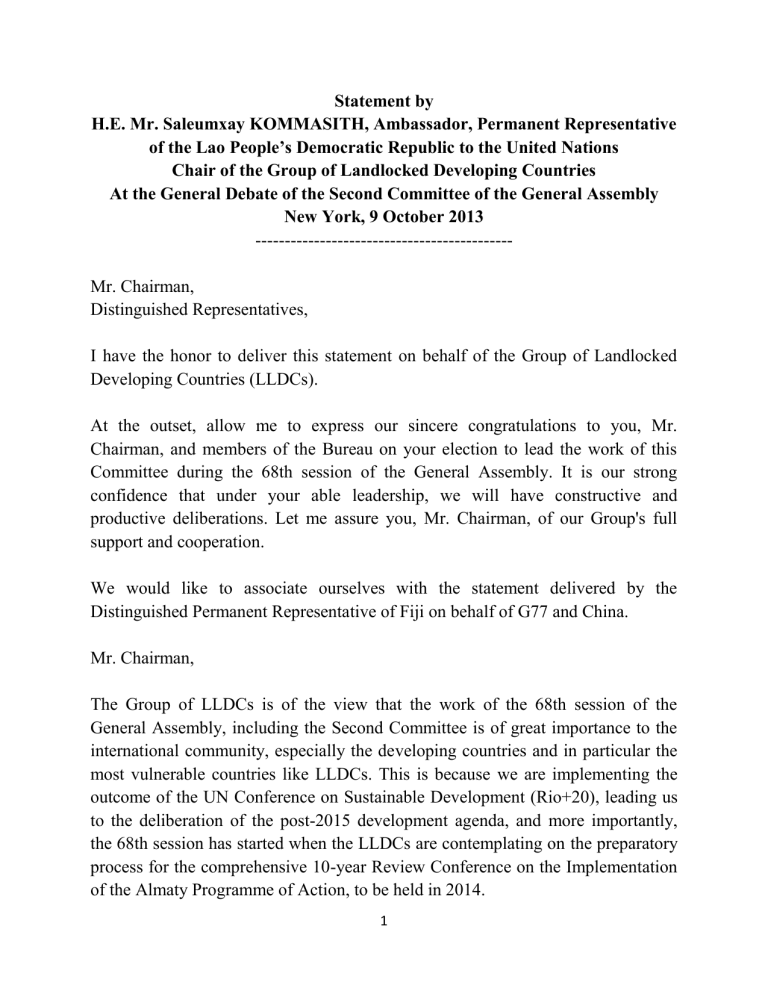
Statement by
H.E. Mr. Saleumxay KOMMASITH, Ambassador, Permanent Representative of the Lao People’s Democratic Republic to the United Nations
Chair of the Group of Landlocked Developing Countries
At the General Debate of the Second Committee of the General Assembly
New York, 9 October 2013
--------------------------------------------
Mr. Chairman,
Distinguished Representatives,
I have the honor to deliver this statement on behalf of the Group of Landlocked
Developing Countries (LLDCs).
At the outset, allow me to express our sincere congratulations to you, Mr.
Chairman, and members of the Bureau on your election to lead the work of this
Committee during the 68th session of the General Assembly. It is our strong confidence that under your able leadership, we will have constructive and productive deliberations. Let me assure you, Mr. Chairman, of our Group's full support and cooperation.
We would like to associate ourselves with the statement delivered by the
Distinguished Permanent Representative of Fiji on behalf of G77 and China.
Mr. Chairman,
The Group of LLDCs is of the view that the work of the 68th session of the
General Assembly, including the Second Committee is of great importance to the international community, especially the developing countries and in particular the most vulnerable countries like LLDCs. This is because we are implementing the outcome of the UN Conference on Sustainable Development (Rio+20), leading us to the deliberation of the post-2015 development agenda, and more importantly, the 68th session has started when the LLDCs are contemplating on the preparatory process for the comprehensive 10-year Review Conference on the Implementation of the Almaty Programme of Action, to be held in 2014.
1
Mr. Chairman,
We would like to stress that the special needs and challenges of landlocked developing countries have long been recognized by the United Nations. They have been reflected prominently in the Almaty Programme of Action, the Millennium
Development Goals and the Rio+20 outcome document. Therefore, addressing those needs and challenges of LLDCs has become international obligation.
The implementation of the Almaty Program of Action is a clear test of how the international community advances the cause of LLDCs. We have witnessed considerable progress in implementing this Programme over the past decade and thus contributing to socio-economic development and well-being of our populations as well as the integration of LLDCs into the regional and global economic system.
However, much work remains to be done. LLDCs continue to face combined adverse effects of landlockedness and new and emerging challenges. These include constraints in reaching global markets, significant financing gaps and the need to improve trade facilitation and integration into the world economy. The economies of landlocked developing countries remain fragile and very vulnerable to external shocks such as the global economic and financial crisis, due to limited export diversification, limited productive capacities, lack of export competitiveness and the high transport and trade transaction costs. In addition, such challenges are becoming worse if they are compounded by the negative impacts of climate change, desertification, land degradation and drought.
It is indeed the fact that regardless of their development level, the status of our landlockedness would never be eliminated, but the impact of landlockedness can be alleviated. This can only be done through genuine cooperation and partnership between the landlocked, transit developing countries and development partners, organizations of the United Nations system and other relevant international, regional and sub-regional organizations and private sector. Therefore, it is of critical importance for the international community to enhance development
2
assistance and cooperation to help LLDCs to overcome their vulnerabilities, build resilience and set themselves on a path towards sustainable development.
In this context, the comprehensive 10-year Review Conference on the
Implementation of the Almaty Programme of Action scheduled in 2014 is of great importance not only for the LLDCs, but also for all stakeholders. This Conference will provide an excellent opportunity for the international community, including the United Nations system, development partners, international organizations, private sector institutions, and academia, to critically consider special needs of and challenges faced by LLDCs, and to help develop priorities for a new, more comprehensive, common action-oriented framework of LLDCs for the next decade, while taking into account new challenges and opportunities.
We have high hope and expectation on the outcome of this Conference and its success would certainly demonstrate the spirit of genuine partnership and mutual assistance among members of the international community. Therefore, in my capacity as Chair of the Group of LLDCs, I wish to take this opportunity to call upon all stakeholders to participate actively in the preparation and organization of this Conference in view of ensuring its successful outcome.
Mr. Chairman,
Let me conclude by emphasizing that the concerns and special needs of LLDCs deserve special attention in all international agendas, including in the process of
Post-2015 development agenda and sustainable development goals. Our Group is committed to working closely with you and all Member States for the successful work of this important Committee during this 68th Session of the General
Assembly.
Thank you
3
